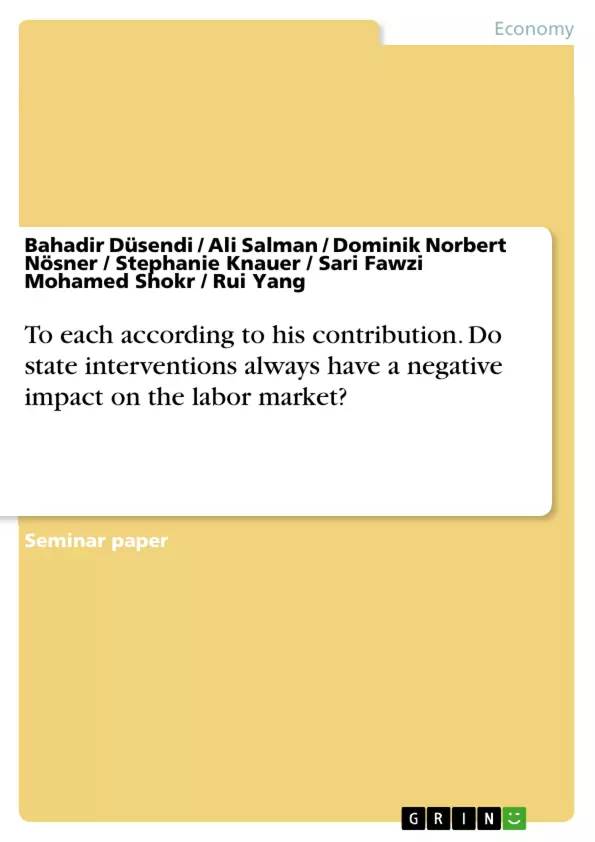In common theory labor is often treated like a normal commodity. This point of view is represented by neo-classical economists. Resulting in their general statement that markets – including the labor market – are driven only by supply and demand thus regulating themselves. Hence there is no space for any external interventions which due to the neo-classical opinion always have a negative effect. This provoking statement leads to the question whether this scenario can be observed in real world.
Based on the book "Debunking Economics" by Steve Keen the following research paper wants to provide a differentiated view concerning labor and how it can be treated in the economy. The first part of the dissemination paper reviews the neo-classical perspectives on the labor market followed by a reproduction of Keen’s critical review concerning the neo-classical theory and his own elaboration of the labor market.
The principle part concentrates on the treatment of labor force in the labor market and the possible outcome of several policies such as introducing or altering minimum wages, unemployment insurance (UI) and trade unions. Regarding to the research question whether an impact of the government has positive or negative impact on the labor market, the aim is to establish a link between labor market regulations, economic policies and theory. In this context the analysis shows what theory suggests and which outcomes can be observed by implementing regulations derived from theory.
Finally the paper sums up the most important results and points out unanswered aspects which could be further discussed and analyzed to evaluate the impacts of external interventions on the labor market more precisely.
Inhaltsverzeichnis (Table of Contents)
- 1 Introduction
- 2 How does the labor market behave?
- 2.1 The labor market from a neo-classical perspective
- 2.2 The individual supply of work
- 2.3 Criticism of the neo-classical model according to Steve Keen
- 3 Unemployment Insurance
- 3.1 The effects of implementing an UI from a neo-classical perspective
- 3.2 Review of the neo-classical assumptions concerning UI systems
- 3.3 Scientific points of view
- 4 Minimum Wages
- 4.1 Definiton minimum wage
- 4.2 Minimum wages from a neo-classical perspective
- 4.3 Arguments in favor of a minimum wage:
- 4.4 Arguments against a minimum wage:
- 4.5 Scientific points of view:
- 5 Trade Unions
- 5.1 Comparison of the liberal and coordinated market economy
- 5.2 Comparison of the German and American institutional framework
- 5.3 Trade Unions in Germany
- 5.4 Trade Unions in the US
- 6 Incentive Wages
- 6.1 USA
- 6.2 Germany
- 6.3 Germany vs. USA
- 6.4 Do interventions have a negative impact?
Zielsetzung und Themenschwerpunkte (Objectives and Key Themes)
This seminar paper explores the impact of state interventions on the labor market, specifically focusing on the effects of unemployment insurance, minimum wages, and trade unions. The paper aims to analyze the neoclassical perspective on these interventions and critically assess their impact on labor market outcomes.
- The impact of state interventions on the labor market
- The role of unemployment insurance in mitigating unemployment
- The effectiveness of minimum wages in raising wages and reducing poverty
- The influence of trade unions on wage bargaining and labor market conditions
- The complexities of incentive wages and their potential consequences
Zusammenfassung der Kapitel (Chapter Summaries)
Chapter 2 introduces the neoclassical model of the labor market, outlining the key assumptions and factors influencing labor supply and demand. Chapter 3 examines the effects of unemployment insurance, analyzing its impact from a neoclassical perspective and reviewing critiques of its effectiveness. Chapter 4 delves into the topic of minimum wages, exploring their potential benefits and drawbacks, and examining the arguments for and against their implementation. Chapter 5 compares the institutional frameworks of liberal and coordinated market economies, focusing on the role of trade unions in Germany and the US. Chapter 6 explores the concept of incentive wages, analyzing their implementation in the US and Germany, and discussing their potential impact on labor market outcomes.
Schlüsselwörter (Keywords)
The paper focuses on key concepts such as labor market interventions, unemployment insurance, minimum wages, trade unions, incentive wages, neoclassical economics, and the comparison of institutional frameworks in different countries.
Frequently Asked Questions
Do state interventions always harm the labor market?
Neoclassical theory suggests they do, but the paper argues that interventions like minimum wages and unemployment insurance can have positive social and economic effects.
What is Steve Keen's critique of neoclassical economics?
Keen argues that labor is not a normal commodity and that the neoclassical model of supply and demand fails to reflect real-world economic complexities.
How do trade unions affect the labor market?
Trade unions influence wage bargaining and labor conditions, with significant differences between coordinated economies (Germany) and liberal ones (USA).
What are the arguments for a minimum wage?
Arguments include poverty reduction, increased consumer demand, and preventing the exploitation of low-skilled workers.
Does unemployment insurance (UI) increase unemployment?
Neoclassical theory claims UI reduces the incentive to work, but scientific views highlight its role as a safety net that stabilizes the economy during downturns.
- Quote paper
- M. Sc. Bahadir Düsendi (Author), Ali Salman (Author), Dominik Norbert Nösner (Author), Stephanie Knauer (Author), Sari Fawzi Mohamed Shokr (Author), Rui Yang (Author), 2014, To each according to his contribution. Do state interventions always have a negative impact on the labor market?, Munich, GRIN Verlag, https://www.grin.com/document/320730



